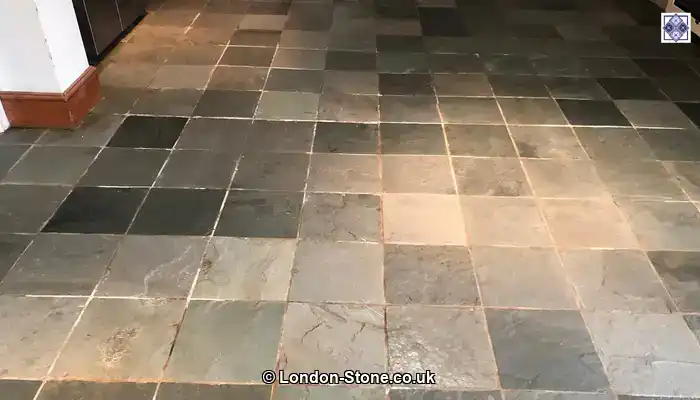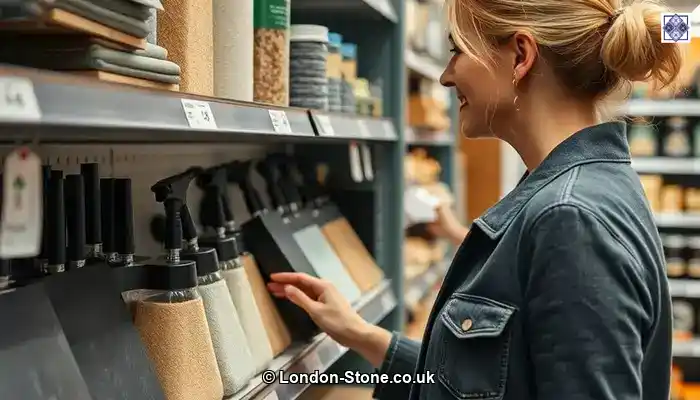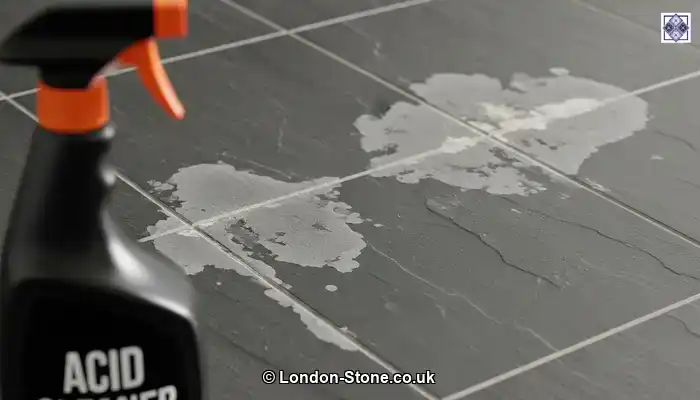Proven Strategies for London Homeowners: Achieving Immaculate Deep-Cleaning of Slate Floors
-
- Professional Care is Essential for Preserving Slate Surfaces, given their unique porous nature that requires meticulous maintenance to retain both their beauty and longevity.
- Consistently Opt for pH-Neutral Cleaning Products to protect the stone’s integrity and preserve its sealants from potential damage.
- Recommended Cleaning Solutions include Lithofin Wexa, Tile Doctor Pro-Clean, and StoneCare International Heavy Duty Cleaner, all highly esteemed for their efficiency in cleaning slate.
- Tailored Approaches for Different Slate Finishes—riven slate often traps more dirt, while honed slate benefits from gentler cleaning options.
- Essential Cleaning Techniques to Implement: Use soft brushes and microfiber mops, and avoid steam or acidic cleaners to maintain the stone’s pristine condition.
- Sealing is Crucial after deep cleaning to protect against moisture, staining, and wear that can compromise the stone’s quality.
- Eco-Friendly Cleaning Solutions are Available, creating a safe environment for families with pets and children.
- Avoid Common Pitfalls Such as Using Vinegar or Bleach, as these can etch the stone and reduce the effectiveness of sealants.
- Grimex and Similar Heavy-Duty Cleaners are effective at tackling tough stains from substances like turmeric, wax, and rubber marks.
- Regular Maintenance Simplifies Care, with resealing recommended every 12–18 months to ensure peak performance in London’s varied climate.
Understanding the Necessity of Expert Care for Optimal Slate Floor Maintenance

Slate is renowned for its sophistication and durability, making it a popular choice for flooring; however, misconceptions often arise regarding its maintenance. It is vital to understand that slate floors can quickly lose their shine if not properly cared for. Without adequate maintenance, slate can become dull and stained, diminishing its overall aesthetic appeal.
Unlike traditional ceramic or porcelain tiles, slate is classified as a metamorphic rock. Its layered structure and varying levels of porosity enable it to absorb moisture, allowing dirt to penetrate its textured surface deeply. This is especially true for riven slate, which is rough and uneven, as opposed to honed slate, which is smooth and polished. Ineffective cleaning methods can lead to grime accumulation, degrading sealants, and causing the stone to appear faded or dull.
A common mistake homeowners make is using generic or acidic cleaning products. Substances like vinegar, bleach, and many “multi-surface” cleaners can etch the stone, compromise protective sealants, and leave residues that attract additional dirt. Steam mops also pose significant risks, as they can force moisture into the stone, potentially resulting in long-term damage and discolouration.
In London’s often humid climate, which is characterised by regular rainfall, slate floors are particularly vulnerable to damage. Organic debris, mud, and moss from gardens or conservatories can easily be tracked indoors. If not adequately sealed or cleaned, these contaminants can settle into the stone, making them increasingly difficult to remove over time.
Understanding the unique properties of slate is essential for effective maintenance. This process goes beyond mere cleaning; it involves preserving the stone’s natural beauty and structural integrity. This requires the selection of suitable products, the application of appropriate techniques, and adherence to a consistent maintenance schedule tailored to the specific conditions of your home.
In the next section, we will explore the best products available for deep-cleaning slate, highlighting those that are both safe and effective, as recommended by professionals across London and beyond.
 Top Quality Products for Comprehensive Deep-Cleaning of Slate Floors
Top Quality Products for Comprehensive Deep-Cleaning of Slate Floors
When it comes to deep-cleaning slate, it is essential to recognise that not all products are created equal. The most effective cleaners are specifically formulated for natural stone, featuring pH-neutral ingredients that effectively remove dirt without damaging the surface or stripping away essential sealants. For homeowners in London, selecting the right product is particularly important due to the region’s humid climate and high foot traffic.
Understanding the Importance of pH-Neutral Cleaners for Slate Maintenance
While slate is a robust and durable stone, it is not immune to damage. Most slate varieties can withstand mild acidic or alkaline exposure; however, if these substances linger on the surface for extended periods—or are used frequently—they can gradually erode the sealants and finishes that protect the stone. Therefore, for routine cleaning, it is advisable to use a pH-neutral cleaner. Such cleaners are gentle on both the slate and its protective coatings, ensuring that your floors remain in excellent condition over time.
Recommended Brands for pH-Neutral Cleaning Products
- Fila Pro Floor Cleaner: An exceptionally effective pH-neutral cleaner specifically designed for regular maintenance on sensitive surfaces.
- HG Natural Stone Cleaner 38: This concentrated mopping solution boasts a pleasant fragrance and is ideal for maintaining slate tiles. It effectively lifts dirt and marks while restoring shine to polished finishes—without leaving residue on non-shiny surfaces.
- Lithofin Easy Care: A versatile cleaning concentrate suitable for regular use on nearly any water-resistant surface within your home. Made with natural soap-based ingredients and gentle alkaline cleaners, it effectively removes everyday dirt while maintaining and enhancing your floors’ appearance with consistent use.
However, there are instances when a more aggressive cleaning approach is necessary. If you encounter cement residue or efflorescence (the white, powdery deposits), a carefully chosen acidic product can be beneficial. Just ensure you rinse the area thoroughly with clean water afterward to prevent any residual damage.
Strong Cleaning Product Suggestions for Tackling Tough Stains
- Lithofin Wexa: A powerful cleaner ideal for eliminating wax, oil, and stubborn dirt from slate. This potent cleaner has a distinct solvent odour; therefore, ensure proper ventilation when using it indoors. It is also advisable to protect any sensitive or painted surfaces nearby, as the formula is designed for heavy-duty cleaning.
- LTP Grimex: An effective cleaner formulated to tackle stubborn grime, grease, and dirt across various surfaces, including slate.
-
<span id=”productTitle” class=”a-size-large product-title-word-break”><a href=”https://amzn.to/45W5iVT”>ECOPROTEC Cement, Grout & Salt Residue Remover</a>: </span>This fast-acting cleaning solution is specifically designed to address tough residues like cement stains, grout haze, salts, and efflorescence. Whether dealing with light build-up or substantial deposits, it can be used diluted for routine cleaning or full-strength for more intensive jobs, providing flexibility without sacrificing results.
Choosing the Appropriate Cleaning Product Based on Slate Finish
Riven slate, with its rugged texture, tends to trap more dirt and necessitates a cleaner with strong emulsifying properties. In contrast, honed slate, being smoother, benefits from gentler formulas that avoid streaks or residues. Always verify product labels to ensure compatibility with your specific type of slate.
For London homes featuring outdoor slate patios or conservatories, select a cleaner that is weather-resistant and suitable for high-moisture environments. Many brands offer concentrated formulas that can be diluted for lighter cleaning or applied at full strength for deep-cleaning purposes.
In the following section, we will guide you through the effective application of these products, ensuring that you achieve optimal results without risking damage to your floors.
Maximising the Effectiveness of Slate Cleaners: Techniques and Tips

Choosing the right product is just one part of the equation in your quest for deep-cleaning slate. To achieve the best results while preventing damage to your floors, you must apply these products correctly. Slate is a natural stone with unique characteristics, and improper cleaning methods can lead to streaks, residue accumulation, or even long-term surface damage.
Step-by-Step Guide to Your Effective Deep-Cleaning Routine
Begin by removing any loose debris. Sweep the floor with a soft-bristled broom or vacuum using a hard-floor setting. This precaution helps prevent grit from scratching the surface during the wet cleaning process.
Next, dilute your chosen pH-neutral cleaner according to the manufacturer’s instructions. Most stone-safe products are concentrated and need to be mixed with warm water to activate their cleaning properties. Apply the solution evenly across the slate using a microfiber mop or a soft cloth. For heavily soiled areas, allow the cleaner to sit for a few minutes to effectively break down the grime.
Utilise a soft brush or a non-abrasive pad to gently agitate the surface. Pay particular attention to grout lines and textured areas where dirt tends to accumulate. Avoid scrubbing too vigorously, especially on honed or sealed slate, as this can lead to wearing down the finish.
Thoroughly rinse with clean water to eliminate any remaining cleaner. It is crucial not to leave residue behind, as this can attract more dirt and dull the stone’s appearance. Employ a wet-dry vacuum or dry mop to remove excess moisture and allow the floor to air dry completely.
Selecting the Most Effective Tools and Techniques for Maximum Cleaning Success
The tools you choose are just as important as the cleaning solution itself. Microfiber mops are ideal, as they effectively lift dirt without scratching the surface. For spot cleaning, use a soft sponge or cloth—never resort to steel wool or abrasive pads.
In homes with outdoor slate patios or conservatories, consider using a pressure sprayer with a low PSI setting for rinsing. This method effectively removes stubborn dirt without causing damage to the stone. Always test any new tool or product on a small, inconspicuous area before applying it across the entire floor.
For deep cleaning larger areas, some homeowners opt for rotary scrubbers equipped with soft-bristled attachments. These machines can be effective, but they must be used cautiously and only with stone-safe products.
Practices to Avoid: Dangers of Acidic Cleaners and Steam Mops
Steer clear of using vinegar, lemon juice, bleach, or ammonia-based cleaners. These substances are excessively harsh for slate and can lead to etching, discolouration, and deterioration of sealants. Even “natural” DIY solutions can pose risks if they are acidic.
Steam mops represent another common mistake. Although marketed as effective for hard floors, the high heat and moisture can penetrate the porous surface of slate, leading to cracking, flaking, or efflorescence over time.
Stick to gentle, proven methods and always follow product guidelines. With the right approach, your slate floors will remain clean, vibrant, and well-protected—whether they are in a busy kitchen, a tranquil hallway, or an outdoor garden room.
In the upcoming section, we will discuss the importance of sealing your slate after cleaning, especially in London’s moisture-heavy environment.
Understanding the Importance of Sealing After Cleaning for Slate Floor Protection
Deep-cleaning slate is merely half of the essential process. To truly safeguard your floors and maintain their natural beauty, sealing is a necessary final step. In moisture-prone regions like London, where rain and humidity are common, sealing slate tiles is vital to prevent future staining, water damage, and premature wear.
Slate is inherently a porous stone, meaning it can absorb liquids and oils if left unsealed. Even after thorough cleaning, unsealed slate remains vulnerable to dirt reabsorption and moisture infiltration. A high-quality sealant acts as a protective barrier, preventing contaminants from entering while enhancing the stone’s colour and texture.
The Benefits of Sealing Your Slate Floors
Sealing provides aesthetic and functional advantages. Primarily, it enhances the natural tones of the slate, giving it a richer, more vibrant appearance. Whether your tiles are riven or honed, sealing accentuates their depth and character.
From a functional standpoint, sealants reduce porosity, making the surface more resistant to spills, grime, and mould. This is particularly crucial in kitchens, hallways, and conservatories—areas that experience significant foot traffic and moisture exposure. In outdoor settings, sealing protects against algae growth and damage from environmental factors.
Moreover, sealed slate is easier to maintain. Dirt remains on the surface instead of infiltrating the stone, allowing for quicker and more efficient cleaning. This translates to less scrubbing, reduced reliance on harsh chemicals, and an extended lifespan for your flooring.
Choosing the Right Sealer for London’s Unique Conditions
It’s essential to note that not all sealers are suitable for slate, and choosing the incorrect one can lead to issues such as discolouration, surface residue, or reduced breathability. If dampness is a concern, opt for a breathable, water-based sealer. These allow moisture vapour to escape while still offering protection against liquid penetration.
Look for products labelled “stone-safe,” “natural finish,” or “enhancing sealer,” depending on your desired aesthetic.
If your slate is exposed outdoors, select a UV-resistant formulation to prevent fading and weathering. For indoor applications, low-VOC sealers are ideal, especially in homes with children or pets.
Application Tips and Recommended Resealing Schedule
Before sealing, ensure that the slate is impeccably clean and dry. Any remaining moisture or debris can hinder adhesion, leading to uneven results. Apply the sealer in thin, even coats using a microfiber cloth, sponge, or roller. Allow each coat to dry thoroughly before proceeding with the next.
Most sealers require a curing time of 24 to 48 hours. During this period, avoid walking on the surface and refrain from exposing it to water. Once sealed, maintain the finish by using stone-safe cleaners and avoiding abrasive tools.
Resealing should occur every 3 to 5 years, depending on foot traffic levels and exposure. High-traffic areas may require more frequent attention, while less frequented zones can extend the interval between applications.
Effective sealing is the cornerstone of enduring slate floors. In the following section, we will explore eco-friendly cleaning alternatives that protect both your stone and your home.
Exploring Eco-Friendly and Safe Cleaning Solutions for Slate Floors
As more London homeowners seek sustainable cleaning methods, the demand for eco-friendly cleaning options has increased—especially for natural stone surfaces like slate. While thorough cleaning is essential for maintaining the beauty and durability of slate floors, it is equally important to choose products and methods that are safe for your family and the environment.
Slate’s porous nature means it can absorb not only moisture and grime but also chemical residues from harsh cleaners. Over time, these residues can degrade the stone, affect indoor air quality, and pose risks to pets and children. Fortunately, a wide range of non-toxic, biodegradable cleaning solutions now exist that deliver powerful results without harmful side effects.
How to Choose Non-Toxic Products for Safety Around Pets and Children
When selecting a cleaner for slate, prioritise products that are labelled as pH-neutral, VOC-free, and safe for use around animals and children. These formulations typically consist of water-based, plant-derived ingredients that effectively clean without leaving harmful chemical residues.
Brands such as Lithofin and StoneCare International offer eco-conscious alternatives specifically designed for natural stone. These products efficiently lift dirt and grime without compromising the integrity of the slate or the health of your household. Furthermore, they are less likely to cause allergic reactions or respiratory issues, making them an excellent choice for families with sensitive individuals.
In addition to cleaners, consider using sealants that are low in volatile organic compounds (VOCs). These often protect the stone while reducing chemical exposure, and many are now available in recyclable packaging to lessen environmental impact.
Supporting Sustainable Brands and Eco-Friendly Practices
Eco-friendly cleaning is not solely about the contents of the bottle—it also encompasses the manufacturing processes of the products. Seek out companies that emphasise sustainability in their production methods, such as using renewable energy, minimising water waste, and offering refillable containers.
Some brands also provide concentrated formulas that can be diluted at home, which reduces the need for single-use plastic and lowers shipping emissions. These products are not only better for the environment but also more cost-effective over time.
For London homeowners eager to go a step further, DIY cleaning solutions can serve as safe alternatives, provided they are used correctly. A simple mixture of warm water and a few drops of washing-up liquid can be effective for light cleaning. However, always conduct a test on a small area first and avoid using anything acidic or abrasive.
Choosing eco-friendly products is a prudent decision that safeguards your slate floors while promoting a more sustainable lifestyle. In the next section, we will address the most frequently asked questions homeowners have about slate maintenance, empowering you to confidently establish your cleaning routine.
Empowering Homeowners: Answers to Common Questions Regarding Slate Floor Care
Slate flooring is a popular choice in London homes due to its inherent beauty and durability. However, due to its porous and textured nature, it requires specific care to remain clean and protected. Below, we provide answers to the most frequently asked questions homeowners have regarding the maintenance of their slate floors.
Is Vinegar Safe for Cleaning Slate Floors?
No, vinegar is acidic and can harm slate by etching the surface and degrading sealants. Although often recommended for general household cleaning, it is unsuitable for natural stone. Using vinegar on slate can lead to dull patches, discolouration, and long-term erosion. Always opt for pH-neutral cleaners that are specifically formulated for stone surfaces.
How Often Should I Deep-Clean My Slate Floors?
For most London homes, deep-cleaning slate floors every three to six months is advisable. Areas with high foot traffic, such as kitchens, hallways, and conservatories, may require more frequent care. Regular sweeping and light mopping with a stone-safe cleaner can help maintain cleanliness between deep cleans. If the floor begins to look dull or feels sticky underfoot, it is time for a thorough cleaning.
What is the Best Mop for Cleaning Slate Tiles?
Microfiber mops are the most effective choice for slate. They effectively lift dirt without scratching the surface and use minimal water, which is critical for porous stone. Avoid using sponge mops, as they can push dirt into grout lines, and steam mops, which introduce excessive moisture and heat that can damage the stone and compromise sealants.
Do I Need to Reseal After Every Deep Clean?
Not necessarily. The frequency of resealing depends on the type of slate, levels of foot traffic, and environmental conditions. In London, resealing is generally recommended every 12 to 18 months for indoor floors and more frequently for outdoor areas. After a deep clean, inspect the surface—if water no longer beads up or the colour appears faded, it is time to reseal.
Can I Use DIY Cleaning Solutions?
Yes, but with caution. A mild mixture of warm water and castile soap can be effective for light cleaning. However, always test any homemade solution on a small, inconspicuous area first. Avoid anything acidic, abrasive, or oil-based. DIY solutions should never replace professional-grade products for deep-cleaning or restoration tasks.
What Should I Do If My Slate is Already Stained?
If stains have penetrated the stone, professional restoration is often the most effective solution. Specialists based in London can utilise advanced equipment and stone-safe products to lift embedded grime, remove stains, and reseal the surface. Attempting to eliminate deep stains with household products may worsen the damage or yield uneven results.
Understanding how to care for slate effectively helps maintain its natural beauty and extends its lifespan. In the next section, we will summarise key strategies and provide next steps for homeowners eager to protect their slate floors for the long term.
The Article What Is the Best Product for Deep-Cleaning Slate Floors? Expert Tips for Surrey Homeowners was first found on https://london-stone.co.uk
The Article Best Product for Deep-Cleaning Slate Floors: Expert Tips for Surrey appeared first on https://fabritec.org
The Article Best Product for Deep-Cleaning Slate Floors in Surrey Was Found On https://limitsofstrategy.com



